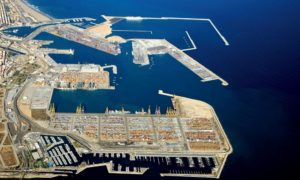
The companies that form part of this initiative promoted by the Port Authority of Valencia have achieved their objectives in areas such as the reduction of fuel and water consumption and the use of alternative energies
València, May 12th, 2021.- Valenciaport has a clear objective: 2030 zero emissions. This is the goal that the Port Authority of Valencia (PAV) has set itself, a plan on which it has already been working for some time and which will allow it to be two decades ahead of the objectives of decarbonisation and reduction of greenhouse gases that Spain, Europe and international organisations have projected for 2050. A common objective in which the entire port community is involved, and which is reflected in concrete and measurable projects.
One of these initiatives is Ecoport II, promoted by the PAV, to improve the environmental state of the ports of Valencia, Sagunto and Gandia. Companies operating in the port area are taking part in this project. The firms have taken stock of the environmental milestones achieved during 2020, objectives that have been formulated voluntarily by the participating companies and which are additional to the Environmental Management System of each one of them.
Specifically, the companies that make up the Ecoport II Environmental Committee formulated a total of seven environmental objectives that could be selected by the companies that wished to do so. In 2020, these objectives were:
- Increase in the percentage of recovered waste. This was selected by 8 companies, 30% of the total. Practically all of them have met the target, with an estimated average decrease of almost 50% of recovered waste and a total of 7,000kg.
- Decrease in water consumption 1%. This objective was chosen by 8 companies, and 75% managed to reduce their water consumption by approximately 27%, equivalent to 4,000 litres.
- Reduction of fuel consumption by 1%. Seventeen companies participated in this line, achieving savings well above the 1% target, estimated at an average of 7% for each company.
- 1% reduction in electricity consumption. Seventeen companies took part, of which 14 achieved a reduction in electricity consumption, with an average of 7.8% for each company, equivalent to 500,000 Kw/h.
- Use of alternative energy sources. Five companies participated in this line, meeting 100% of the expected target.
- Calculation of the Carbon Footprint. The objective was selected by 12 companies, and 83% achieved this objective.
- Participation in environmental initiatives. The 16 companies that chose this line actively participated.
During 2020, in terms of training and awareness-raising given in certified and level 5 companies, either within the framework of Ecoport II or carried out internally by each company. A total of 3,800 person-hours have been spent, out of the total number of workers that make up all the companies, and 40% of them have completed the training courses.
Currently, the Environmental Committee of the Ecoport II project is made up of 27 companies: Aljibes Bosca, Amarradores del Puerto de Valencia, S.L., APM Terminals Valencia, Autoridad Portuaria de Valencia, Balearia Eurolineas Maritimas, S. A., Burriel Navarro (Trident), Productos Asfálticos, S.A.(CEPSA), Fertiberia, S.A., Galp Energía España, S.A.U., Garbaport, Intersagunto Terminales, S.A., MSC Terminal Valencia, S.A., Noatum Terminal Sagunto, CSP Iberian Valencia Terminal S.A.U, Portuaria Levantina, S.A. (PORLESA), Prácticos de Valencia SLP Remolcadores Boluda, S.A, Planta de Regasificación de Sagunto, S.A. (SAGGAS), Infraportva S.L.U., Terminales Portuarias, S.L. (Tepsa), Sertego Puerto de Valencia, Trasmediterránea, S.A., Transportes Remedios Torres, S.L., Seroil Valencia, S.L., Valencia Terminal Europa S.A. (VTE) , Vareser96, S.L and Velas Lluch, S.L.

